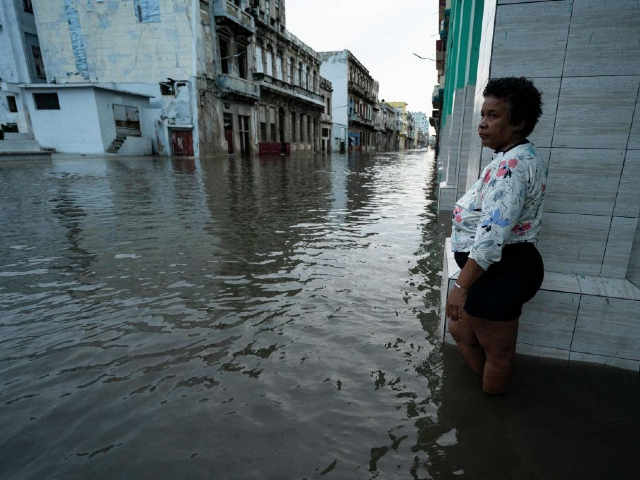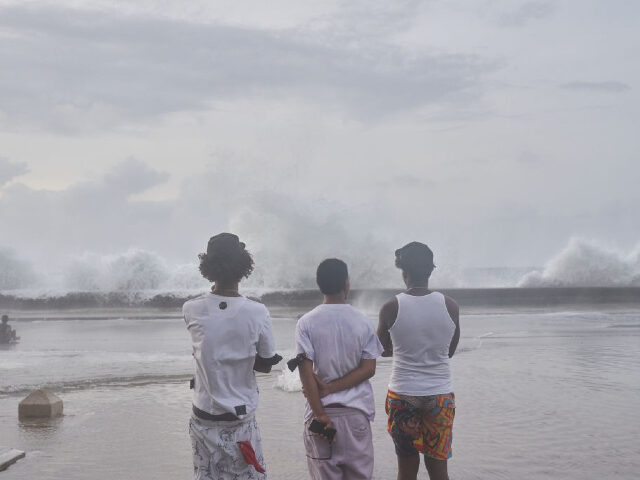At least three different groups of Cuban refugees have attempted, some successfully, to voyage by sea to Florida in the past week, attempting to use Hurricane Ian to avoid detection by the U.S. Coast Guard.
Video from local Florida news networks revealed that at least one group of seven Cuban refugees landed in Pompano Beach on Tuesday, the same day Hurricane Ian made landfall on the island as a Category 3 storm. Ian swept through Cuba’s westernmost province, Pinar del Río, leveling entire communities and destroying critical farmland. As of Tuesday night, the entire island of Cuba’s power infrastructure had collapsed, according to the Communist Party’s electric agency.

TOPSHOT – A woman stands on a flooded street in Havana, on September 28, 2022, after the passage of hurricane Ian. – Cuba exceeded 12 hours this Wednesday in total blackout with “zero electricity generation” due to failures in the links of the national electrical system (sen), after the passage of powerful Hurricane Ian. (Photo by YAMIL LAGE / AFP) (Photo by YAMIL LAGE/AFP via Getty Images)
Shortly before the storm, the U.S. Coast Guard confirmed the detention of a second group of Cuban refugees on Monday.
On Wednesday, the Coast Guard announced that it was launching a search for a third group of refugees, believed to be 23 people, most of whom had disappeared on a makeshift vessel while attempting to navigate the storm to land in America.
Under far-left President Joe Biden, America’s border and immigration agencies have focused their attention on discouraging Cuban refugees, who are fleeing a far-left communist regime and whose exile community in the United States tends to vote Republican, from leaving the island by sea. For decades, Cubans who touched American soil were considered legally present in the country under a policy known as “wet foot, dry foot.” Leftist President Barack Obama, for whom Biden served as vice president, ended the policy during his tenure as part of a large package of concessions to the Communist Party that also included the hollowing out of sanctions against the violent authoritarian regime and freedom for Cuban regime spies responsible for American deaths.
Mass deportations of Cuban balseros, or rafters, have become a common sight under Biden, even as the U.S. southern border grapples with tens of thousands of migrants from all over the world requesting asylum and largely being allowed in. The migrants reaching America by land, including a growing number of Cubans, must pay thousands of dollars to coyotes, or human traffickers, associated with drug cartels and other organized criminal groups in Mexico and South America. In contrast, Cubans attempting to reach America by sea do so on their own.
The U.S. Coast Guard confirmed on Tuesday that a group of seven Cuban nationals had landed successfully on Pompano Beach in southeastern Broward County, Florida. The refugees were reportedly “taken into custody,” but authorities have yet to confirm if they will be deported back to Cuba, where they may face violent arrest and torture for attempting to flee. Video taken by locals in Pompano Beach showed the group, apparently all men, swimming to shore, with their vessel not in sight. The small wooden boat, with the word “freedom” written in Spanish on its side, ultimately also made it on land.
On Wednesday, the Coast Guard issued another announcement confirming it was looking for 23 Cuban refugees that went missing. Authorities reportedly became aware of them after four of the people in their group “swam to shore after their vessel sank” in the hurricane. At press time, three of the 23 have been found with “symptoms of exhaustion and dehydration.” The Coast Guard took the opportunity to scold Cuban refugees who opt not to rely on Mexican cartels and human smugglers to reach America, using its #DontTakeToTheSea hashtag for updates on the missing people.
#BREAKING: U.S. Border Patrol agents along with support from @mcsonews responded to a migrant landing in Stock Island #Florida. 4 Cuban migrants swam to shore after their vessel sank due to inclement weather. @USCGSoutheast initiated a #SAR operation to search for 23 individuals. pic.twitter.com/yUurGfSOSe
— Chief Patrol Agent Walter N. Slosar (@USBPChiefMIP) September 28, 2022
The independent Cuban outlet Cubanet also reported on the rescue of a group of Cuban refugees in the Florida Straits on Monday, shortly before the hurricane began affecting communities on land in the Caribbean.
The U.S. Coast Guard reports that it has “rescued” over 6,000 Cuban refugees, many of them returned to the yoke of communism.
Cubans arriving in the United States through tropical storms and hurricanes is becoming an increasingly common sight under Biden. Last year, shortly before the nationwide protests against communism on July 11, a camera in Hallandale Beach, Florida, caught the sight of about five Cuban refugees swimming to shore, navigating through Tropical Storm Elsa to get there. Footage was taken from a nearby building. Locals reportedly offered the men water and directions to Miami Beach. The U.S. Coast Guard arrived 30 minutes after they landed; their fate remains unknown at press time.
Secretary of Homeland Security Alejandro Mayorkas, who has taken a soft tone towards migrants from other countries arriving by land, has embraced hardline opposition to Cuban refugees seeking freedom by sea without the aid of organized criminal syndicates in Mexico. The U.S. Coast Guard also regularly announces the capture and deportation of refugees from communism at sea.
“The time is never right to attempt migration by sea. To those who risk their lives doing so, this risk is not worth taking,” Mayorkas warned in a post on Twitter in July 2021, before the nationwide protests. “Allow me to be clear: If you take to the sea, you will not come to the United States.”
Biden authorities have gone as far as to warn Americans not to help Cuban refugees on the high seas, threatening them with prison time.
The devastation left behind by Hurricane Ian in Cuba is likely to spur even more migration out of the island, as early reports indicate many in Pinar del Río have lost their homes and livelihoods and food supplies may be in jeopardy. Regime officials have said that they assess “considerable” damage in Western Cuba, but have yet to specify the extent of the damage or offer tolls of dead and wounded.
Significant damage also occurred in Havana, where the Communist Party’s total lack of investment in infrastructure has resulted in buildings regularly collapsing even in fair weather. Photos shared by locals on social media show large roads in the capital entirely blocked by rubble.
#ULTIMAHORA Reportan derrumbe en #LaHabana en la zona de Los Sitios, por suerte no se informa extraoficialmente ninguna persona herida. Son los efectos de la lluvia del #HuracanIan en #Cuba. #HurricaneIan #Hurricane pic.twitter.com/lOyee8vjm1
— Daniel Benitez (@danielbnews) September 27, 2022

COMMENTS
Please let us know if you're having issues with commenting.